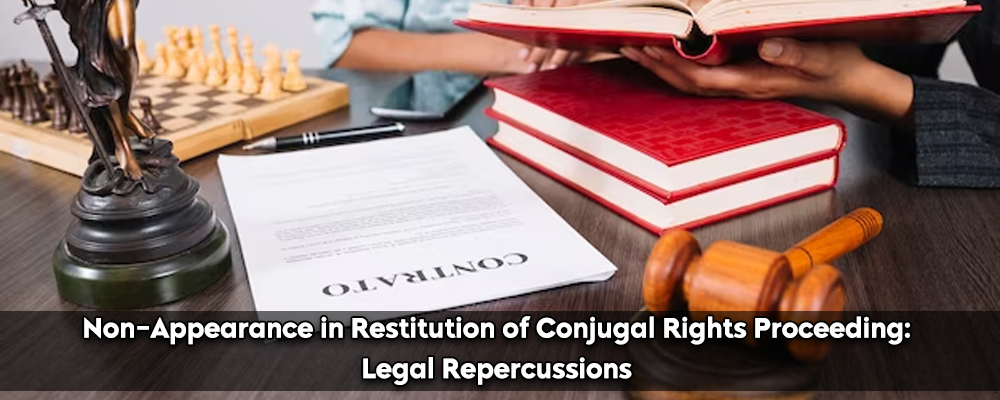Although marriage is a holy bond between two people, there may be times when difficulties arise in the union and cause a separation or brief estrangement. The idea of “restitution of conjugal rights” is relevant in these situations. It is a legal remedy made available by the law to promote spouses’ reconciliation and repair their marital relationship. However, there may be serious civil repercussions if one party declines to take part in the legal action for the restoration of conjugal rights.
Restitution of Conjugal Rights
Restitution of conjugal rights is a widely used legal term, notably in India. It is predicated on the idea that marriage is a crucial institution that merits all attempts at reconciliation before turning to dissolution. Using this remedy, one spouse can ask the court for a ruling requiring the other spouse to live together and uphold their marriage.
Need A Legal Advice
The internet is not a lawyer and neither are you. Talk to a real lawyer about your legal issue

The basic goal is to foster reconciliation within the framework of marriage, even though other jurisdictions may have different legislation regarding the recovery of conjugal rights.
Non-appearance in Proceedings: Legal Repercussions
There may be serious legal repercussions if one spouse declines to appear in a case for restitution of conjugal rights. Some of the main repercussions are as follows-
Contempt of Court
When a spouse refuses to appear in the proceedings after being properly served with a notice, the court may hold the spouse in contempt. Fines, jail, or other harsh penalties may be imposed for contempt of court, depending on what the judge deems suitable.
Adverse Effect
The absence from a proceeding entitles the court to draw conclusions that are not favourable to the absent spouse. The reluctance to take part may be interpreted by the court as an acknowledgment of the charges contained in the petition.
Issuance of Order
The court has the authority to issue an order for the restoration of conjugal rights if it determines that the petitioner’s claim has validity and that the refusal to appear in the proceedings is unjustified. The non-appearing spouse may be required by the court to live with and have sexual intercourse with the other spouse once more.
Legal Fees
The non-appearing spouse may be required to pay the petitioner’s legal fees incurred throughout the procedures.
Consequences on Divorce Case
Failing to appear in a court proceeding to restore marital rights may have repercussions for divorce actions that are later brought. Refusal to abide by a restitution order may be taken into account as proof of a permanent breakdown of the marriage, which could have an effect on the divorce process.
Role of Judiciary: Supreme Court
In the case of Poonam Anjur Pawar vs Ankur Ashokbhai Pawar, the Supreme Court ruled that in a case where one spouse filed an RCR petition but the other did not take an active part in the proceedings. The respondent’s (that is, the party against whom the Restitution of Conjugal Right is filed)’s non-appearance, according to the court, indicates a lack of interest in reconciliation and reveals a careless attitude toward the sacred institution of marriage.
The court made clear that the purpose of the Restitution of Conjugal Right is to investigate the likelihood of reconciliation and that both parties should take an active part in the procedure. The respondent’s non-appearance could be interpreted as a refusal to resolve the problems that caused the separation and, in essence, as a wish to dissolve the marriage.
Appearance in Restitution of Conjugal Right: Importance
The importance of appearance in the Restitution of Conjugal Rights is as follows-
Reconciliation Encouragement
The purpose of the Restitution of Conjugal Rights procedures is to promote reconciliation between separated spouses. Active involvement shows a sincere desire to reconcile issues and mend the connection.
Respecting the Legal Framework of Marriage
Participating in Restitution of Conjugal Rights proceedings demonstrates respect for the institution of marriage, the legal system, and the legal process in general.
Avoiding Petition Dismissal
If the respondent doesn’t participate, the court may dismiss the Restitution of Conjugal Rights petition, leaving open doors for reconciliation.
Indications of Irretrievable Breakdown
If attempts at reconciliation are unsuccessful; the absence from Restitution of Conjugal Right proceedings may be used as proof of the marriage’s irretrievable breakdown in subsequent divorce proceedings.
Conclusion
In addition to being essential for exploring the potential of reconciliation, active appearance in Restitution of Conjugal Right proceedings have serious legal repercussions. It offers a chance for separated partners to reconcile, talk, and look for answers while respecting the honor of the marriage institution.
Regardless of whether reconciliation is successful, the process enables a more efficient resolution of conflicts, reducing the emotional and financial burden on both parties.
One can talk to a lawyer from Lead India for any kind of legal advice. In India, free legal advice online is accessible at Lead India. Along with having free legal advice online, you can even ask questions to experts online free from Lead India.





 Talk to a Lawyer
Talk to a Lawyer